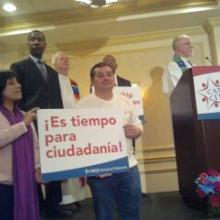Citizenship
This morning at breakfast, I was reading an article in the newspaper about how the Affordable Care Act is negatively affecting some individuals — especially those who buy their own insurance, rather than receiving it through an employer. The article was interesting, but what struck me the most was the way the problem was framed. Rather than approaching the story from a public policy angle, the article mainly focused on the reaction of consumers of health-care goods and services. The crux of the article was whether some individuals should be required to buy a product they might not want or need so that other individuals could have affordable access to health-care products they need desperately but might not be able to afford under the old regime.
The dilemma was presented as a story of tension between healthier consumers and less healthy consumers fighting to get the best deal for their health-care dollars. But could there be another way of thinking about health care, and about our society as a whole? Is there a framework that would allow us to consider these questions in a way that assumed connection, caring, and community between individuals, rather than the zero-sum competition of the market?
House Speaker John Boehner, R-Ohio said in an interview with CBS on Sunday that “immigration reform isn’t about him.” Denying CBS’s Bob Corner insight in to his own personal views on immigration, Boehner refused to share details about what parts of the immigration bill he feels should pass the House when it comes time for their final debates. Boehner, who is opposed to granting citizenship for illegal immigrants, claimed the bill which passed the Senate last month will “not pass the House.”
The Guardian reports:
The Senate has passed a sweeping, bipartisan immigration bill that includes a pathway to citizenship, which Republican opponents have called an "amnesty" that would reward lawbreakers and attract more illegal immigrants. Boehner said taking a personal stand on the issue would make it harder for him to find consensus on immigration in the House.
Read more here.
A common sentiment that’s expressed by both the left and the right on the issue of immigration reform is that immigrants need to prove their faithful adherence to the law and contribution to society before they’re put on some path to citizenship. It's redemption by works. It’s a reasonable means to verify their willingness to contribute to society. But a disconcerting irony dawned on me amid all this mutual give-and-take language we hear about immigrants; that is, many citizens themselves do not heed the same exhortation to contribute to their country today.
This is encouraged by the fact that citizenship today is identified entirely by a piece of paper, not by a way of life — by ink, not by deed. Although one’s citizenship technically includes a whole list of rights and duties, the fulfillment of these rights and duties is not a part of the identification process. This is understandable, as it’s very difficult to tell whether someone is trying to contribute to the state or merely trying to get what they can out of their legal privileges. I'm not out to start a Civil Reformation or something. But these thoughts have reminded me that the standard the Bible sets for Christian citizenship in heaven is something else entirely.
New Calvinists today have hammered home the doctrine of justification by faith through grace, not by works or legalistic moralism. Kingdom citizenship is claimed by faith in Christ. Got it.
Yet, Scripture is emphatic that Kingdom citizenship is not identified by faith alone, but also by works.
On Jan. 17, faith leaders, DREAMers, and community leaders from across the country gathered in Washington, D.C., to launch a new Campaign for Citizenship — an effort to pressure Congress to enact reform that prioritizes citizenship.
The Campaign for Citizenship, a project of PICO National Network, invited our country’s leaders to gather and view the “Separated Families Supper Table.” At the table gathered DREAMers and clergy next to empty seats representing the millions of homes around the country experiencing family separation as a result of our broken immigration system.
As each member at the table spoke, they expressed how every day, families like theirs have to sit at their dinner tables and try to cope with the fact that a family member is missing. They have to live in constant worry for their family member’s safety and well-being in a distant land that is oftentimes unfamiliar to them. Families are experiencing real loneliness and grief.
Next week I will vote for the first time in a presidential election. I became a naturalized U.S. citizen two years ago, giving up my Korean passport, my (not)green card, and pledging allegiance after having lived in the U.S. since the spring of 1971.
I actually studied for my citizenship exam out of fear and habit – fear that the wrong answer would mean restarting a process that had cost money, time, and emotions, and habit because I grew understanding not studying was not an option. The process actually took years for me, wrestling through ambivalence, frustration, grief, and gain to get to a point where the privileges, advantages, and necessities of becoming a citizen and my faith as a Christian pushed me over the edge.
Debates on immigration in the United States continue to move in the default direction of North/South. As such, the prominent debating points often direct public attention to the U.S./Mexico border fence and the Latina/o community. By sleight-of-hand, many in the mainstream media tend to recast a centuries-old U.S. immigration experience as a Latina/o problem.
Unlike the variety of migration stories in the Bible, the forces creating migration for many Latina/o families are closely tied to the issues of power and hyper-consumerism. Often as a last resort do immigrant families enter the northbound currents of low-wage laborers that, as Bishop Minerva Carcaño describes, feed “the economic machine in this country.”
Politics And Prayers; Senate Passes Insider-Trading Bill; What Childhood Poverty Means (OPINION); Nation-Building Vs. Al-Qaeda-Crushing In Afghanistan; Should All Americans Have To Earn Their Citizenship?; That Former Slave Who Wrote His Ex-Master Never Went Back To Him; NC's Heath Shuler Won't Seek Re-Election To House; Syria: It’s Not Just About Freedom (OPINION); Jobs Report: Unemployment Rate For Returning Veterans Fell 6 Percentage Points.
The forthcoming dedication of the national memorial monument honoring Rev. Dr. Martin Luther King, Jr., affords an opening for considering the complexity and meaning of his leadership. He was not the tamed and desiccated civil hero as often portrayed in the United States around the time of his birthday, celebrated as a national holiday. He was until the moment of his death raising issues that challenged the conventional wisdom on poverty and racism, but also concerning war and peace.
King was in St. Joseph's Infirmary, Atlanta, for exhaustion and a viral infection when it was reported that he would receive the 1964 Nobel Peace Prize. As Gary M. Pomerantz writes in Where Peachtree Meets Sweet Auburn, this was the apparent cost exacted by intelligence surveillance efforts and the pressures of learning that Attorney General Robert F. Kennedy had formally approved wiretaps by the Federal Bureau of Investigation. His evolving strength as a leader is revealed in his remarks in Norway that December, which linked the nonviolent struggle of the U.S. civil rights movement to the entire planet's need for disarmament.
I admit it: A few years back, when I first heard about the E-Verify program, I thought it sounded reasonable. The program was described to me as a way for employers to voluntarily verify the U.S. citizenship of their employees by cross-checking their information with the online databases of the Department of Homeland Security and the Social Security administration. I knew that there were flaws in the system, which sometimes misidentified workers as undocumented even when they were not. However, I thought, what employer doesn't deserve the right to check the employment eligibility of his or her workers?
Walmart has launched a charm offensive as part of its new urban strategy to impose smaller versions of its big box in inner cities across the country. It has proposed four stores for Washington, D.C. -- all in predominantly minority, and most in low-income, neighborhoods.
The debate over building Walmart stores in D.C. is engaging intense public sentiment, and for good reason. While Walmart promises new jobs in a community, in reality it displaces other local businesses, leaving in question whether there is a net jobs gain; one study showed that for every retail job Walmart brought, communities lost 1.4 other jobs. In addition, Walmart passes on the cost of its low wages to taxpayers when associates and their families rely on publicly funded health care and other assistance programs.
 My office has two overflowing bookshelves, with more books stacked on top and on the windowsill. But above my desk within easy reach is a small shelf. On it I keep those books I most regularly use in thinking and writing. Here are the top 10.
My office has two overflowing bookshelves, with more books stacked on top and on the windowsill. But above my desk within easy reach is a small shelf. On it I keep those books I most regularly use in thinking and writing. Here are the top 10.
1. The Bible: What can I say about the foundational source of God's guidance in everything? I read or refer to it nearly every day. It was given to us "for teaching, for reproof, for correction, and for training in righteousness" (2 Timothy 3:16).
2. The Book of Common Prayer: I am not Anglican/Episcopalian, but there is something in the formal prayers of the traditional liturgy that resonate with my soul. On those days I really don't feel like praying or can't find the words, it's comforting to have a place to turn for inspiration.
Our current practice in the U.S. actually reflects the earlier legal reality of coverture: In the process of the "two becoming one flesh," the wife lost her rights to property, legal representation in court, and even her public identity as her husband became the sole representative for the family. This combination of identities (or, rather, the wife becoming lost in her husband's identity) led to wives taking their husbands' last names. For me, losing my surname would have represented silent assent to this oppressive practice.
The issues surrounding immigration are politically complex and emotionally charged, especially at a time when many Americans are experiencing severe economic distress.





